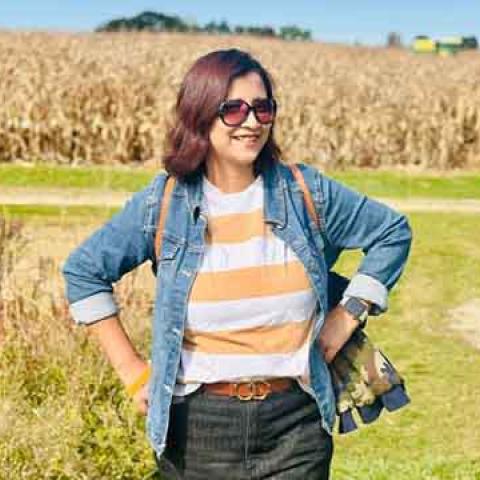The secret to understanding how to treat diseases like Alzheimer’s might be found in the structural function of the proteins linked to them. Amita Sahoo is among those working to gain new insights.
Sahoo, a postdoctoral scholar in the Department of Physiology and Biophysics at Case Western Reserve University School of Medicine, employs advanced computational approaches, such as AlphaFold AI and molecular dynamics (MD) simulations, allowing her to model these membrane proteins within lipid bilayers that reflect their natural microenvironments. She is a member of Matthias Buck’s lab.
Sahoo’s recent research has led to three notable collaborative publications. One paper, accepted in Science Advances, explores how PIP2 impacts the heterodimerization of EGFR with EphA2. Another, under revision with Communication Biology, investigates cholesterol’s role in activating EphA2. The third paper, which received very minor revisions from Nature Communications, examines the structural basis for ligand promiscuity and signaling of the Kaposi’s sarcoma-associated herpesvirus encoded GPCR, ORF74.
Her work has been presented at prominent conferences, including the Biophysical Society meeting in February 2024 and the DPB retreat in October 2024, where she discussed the homodimerization of EphA1 and EphA2. Most recently, she began a collaboration with P.C.T. Souza from the University of Lyon to enhance the Martini3 force field for coarse-grain simulations, aiming to refine the model’s accuracy by incorporating detailed backbone torsions and side-chain rotamers.
While her research is a big aspect of her life, Sahoo places a strong emphasis on work-life balance. Outside the lab, she enjoys painting and cooking Indian cuisine.
1. What has been your best experience so far as a CWRU postdoc?
As a postdoc at Case Western Reserve University, my best experience has been the opportunity to engage deeply with cutting-edge research while being part of a collaborative and intellectually stimulating environment. Beyond the research, the chance to collaborate with experts across different disciplines and labs has enriched my work and opened new avenues for learning.
CWRU’s focus on interdisciplinary research aligns perfectly with my interests, enabling me to contribute to projects that span molecular biology, bioinformatics and biophysics.
Another highlight has been the mentorship and support I’ve received from my supervisor, Dr. Matthias Buck, who has given me the flexibility to manage my schedule while maintaining a strong work-life balance. This, coupled with the collaborative culture at CWRU, has made my postdoc journey fulfilling both professionally and personally.
2. How do you think the postdoctoral experience at CWRU is helping you prepare and advance toward your goals?
The postdoctoral experience at CWRU is providing me with an invaluable foundation to advance toward my long-term goals in academia and research. First and foremost, it has allowed me to hone my technical and analytical skills through hands-on experience with cutting-edge tools and methodologies, particularly in the areas of molecular dynamics and membrane protein interactions. Working with advanced resources like Anton2 and leveraging interdisciplinary collaborations has expanded my expertise in computational biology, which will be crucial for my future independent research endeavors.
Moreover, CWRU’s collaborative environment encourages the exchange of ideas across disciplines, which has helped me develop a broader perspective on scientific problems and innovate in my own research. I’ve gained valuable experience not only in leading my projects but also in contributing to larger team efforts, which is preparing me for future leadership roles in research.
Overall, my postdoc at CWRU is equipping me with the skills, knowledge, and network needed to transition into an independent researcher and achieve my academic and professional goals.
3. What’s your best piece of advice on how postdocs can make the most of their postdoc career and prepare for their future goals?
The best piece of advice for postdocs looking to make the most of their postdoc career and prepare for future goals is to actively seek out opportunities for growth both in research and professional development. Here are some key strategies to consider:
- Network actively: Build relationships within and outside your immediate research group. Attend seminars, workshops and conferences to connect with other researchers and potential collaborators. Networking can open doors to new opportunities and insights that can enrich your research.
- Seek mentorship: Identify mentors who can provide guidance not only on research but also on career paths and professional development. Regularly seek feedback on your work and discuss your career aspirations with them.
- Focus on publications: Prioritize getting your research published. High-quality publications are crucial for advancing your career in academia and can significantly enhance your CV when applying for faculty positions or grants.
- Plan for the future: Set clear short- and long-term career goals, and regularly assess your progress. Take advantage of any resources your institution offers for career planning, such as workshops on job applications, CV writing, and interview preparation.
- Maintain work-life balance: Don’t forget the importance of well-being. A healthy work-life balance can enhance productivity and creativity, ultimately benefiting your research and professional journey.
4. What are your career goals after your postdoc?
After my postdoc, my main career objective is to obtain a position as an independent scientist at a research-focused institution. I plan to further my research on cellular signaling and membrane dynamics, with a particular emphasis on the role of signaling lipids and their impact on membrane protein signaling.
I aim to design innovative research projects that connect basic science with clinical applications. In addition, I aspire to cultivate a collaborative research environment, where I can mentor students and junior researchers while encouraging interdisciplinary approaches.


